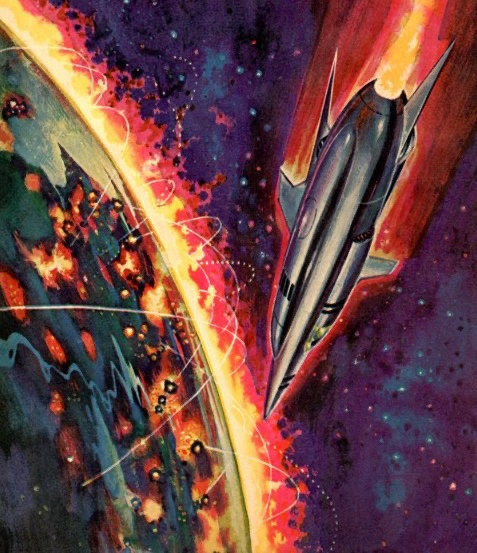Text

Damn. Just damn.
Way too young at 65.
One of the poetry heroes of the UK, and a constant force against injustice.
We need these poet-warriors now more than ever.
Safe journey on, Benjamin.
0 notes
Text
These days, I really am running out of words. I know that I can't stop writing - I mustn't stop - but it's hard to find anything to say that might do some good. It is horror upon horror.
Look after yourselves and keep striving for a better world.
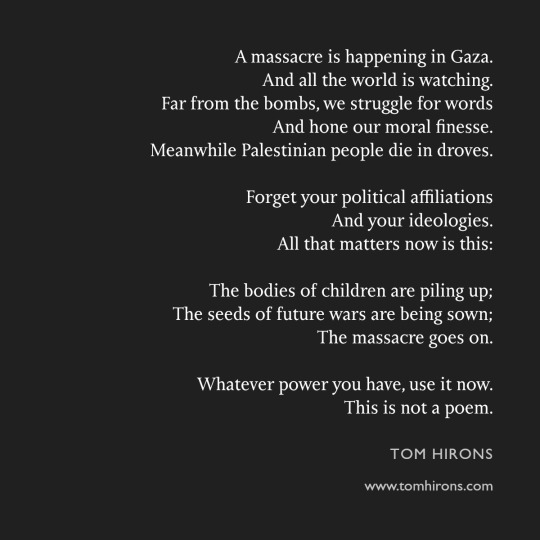
Write to your MP or your senator.
Shout loud.
Talk to one another.
Support each other across communities.
Resist the old urges to blame people based on their race or religion. There's a better way.
And if you have the spanners to dismantle even a tiny piece of the war machine, use them.
3 notes
·
View notes
Photo

Pablo PIcasso: Guernica (1937) 137.4" x 305.5", oil
Robert Hughes:
Picasso’s Guernica, 1937 is the last of the line of formal images of battle and suffering that runs from Uccello’s Rout of San Romano through Tintoretto to Rubens, and thence to Goya’s Third of May and Delacroix’s Massacre at Chios. It was inspired by an act of war, the bombing of a Basque town during the Spanish Civil War. The destruction of Guernica was carried out by German aircraft, manned by German pilots, as the request of the Spanish Nationalist commander, General Emilio Mola. Because the Republican government of Spain had granted autonomy to the Basques, Guernica was the capital city of an independent republic. Its razing was taken up by the world press, beginning with The Times in London, as the arch-symbol of Fascist barbarity. Thus Picasso’s painting shared an exemplary fame of the event, becoming as well known a memorial of catastrophe as Tennyson’s Charge of the Light Brigade had been eighty years before.
Guernica is the most powerful invective against violence in modern art, but it was not wholly inspired by the war: its motifs– the weeping woman, the horse, the bull– had been running through Picasso’s work for years before Guernica brought them together. In the painting they become receptacles for extreme sensation– John Berger has remarked, Picasso could imagine more suffering in a horse’s head than Rubens normally put into a whole Crucifixion. The spike tongues, the rolling eyes, the frantic splayed toes and fingers, the necks arched in spasm: these would be unendurable if their tension were not braced against the broken, but visible, order of the painting. It is like a battle sarcophagus, cracked and riven, but still just recognizable as a messenger from the ancient world– the world of ideal bodies and articulate muscular energy, working in flat carved stone space. As a propaganda picture, Guernica did not need to be a specific political statement. The mass media supplied the agreement by which it became one, and Picasso knew exactly how and where to insert his painting into that context– through the Spanish pavilion at the Paris World Exhibition, where it was shown in 1937 as a virtually official utterance by the Republican government of Spain. Seen detached from its social context, if such a way of seeing were either possible or desirable (in Picasso’s view it would not have been, but there are still formalists who disagree), it is a general mediation on suffering, and its symbols are archaic, not historical: gored bull and speared horse (the Spanish Republic); the bull (Franco) towering over the bereaved, shrieking woman; the paraphernalia of pre-modernist images like the broken sword, the surviving flower, and the dove. Apart from the late Cubist style, the only specifically modern elements in Guernica are the Mithraic eye of electric light, and the suggestion that the horse’s body is made of parallel lines of newsprint, like the newspaper in Picasso’s collages a quarter of a century before. Otherwise its heroic abstraction and monumentalized pain hardly seem to belong to the time of photography and Henkel 51s. Yet they do: and Picasso’s most effective way of locating them in that time was to paint Guernica entirely in black and white, and gray, so that despite its huge size it retains something of the grainy, ephemeral look one associates with the front page of a newspaper.
Guernica was the last great history painting. It was also the last modern painting of major importance that took its subject from politics with the intention of changing the way large numbers of people thought and felt about power.
click image for details
51 notes
·
View notes
Text
"Recreation" by Audre Lorde
Coming together
it is easier to work
after our bodies
meet
paper and pen
neither care nor profit
whether we write or not
but as your body moves
under my hands
charged and waiting
we cut the leash
you create me against your thighs
hilly with images
moving through our word countries
my body
writes into your flesh
the poem
you make of me.
Touching you I catch midnight
as moon fires set in my throat
I love you flesh into blossom
I made you
and take you made
into me.
33 notes
·
View notes
Text
Okay, here's my idea:
The British should put a time limit on the Monarchy.
Not like declaring a republic tomorrow, but deciding on a date in the future that ends the British Monarchy.
And there's a perfect date for it coming up!
October 14th, 2066.
A thousand years since the Battle of Hastings. A thousand years of this one specific bloodline ruling England.
Call time on the Monarchy after exactly one thousand years. Nice, and neat.
Even better: Charles isn't living 44 years. He'll be gone in about twenty. Now William? He's what, 40? Yeah, he can live another 44 years. His great grandmother was over a hundred, his granny was 96, William can make it to 84 barring accident or assassination.
So on October 14th 2066, William the Last steps down a thousand years after William the First won the crown.
Nice, neat, and fair. William gets the crown he's been waiting forty years for already, but ten-year-old George grows up without expectation of it.
Have a nice big abdication ceremony, even.
105K notes
·
View notes
Text

— CZESŁAW MIŁOSZ, translated from the Polish by Czesław Miłosz & Robert Hass.
3K notes
·
View notes
Text

OPENING THE POETRY DOOR
with NIKITA GILL (and me...)
FANFARE!
On Saturday November 11th, Nikita Gill (yes, @nikita_gill !) and I are running a two-hour online workshop with the express aim of empowering more of you to write poetry, and to feel as if you belong in the poetry room*
Poetry is folk medicine. It’s not a thing to be caged in dusty libraries. It belongs in bars and bedrooms, round dinner tables, at weddings and funerals, in conversations and in silence. Anywhere and everywhere, there’s a place for poetry. It’s the sound of truth being spoken in powerful ways and we all have truth to relate, the truth of our experience of this world, this life. We all have stories to tell and we all have the capacity to reach each others’ hearts.
As well as dialogue and wider conversation, we'll be offering exercises and perspectives to crack open and tease out your creative voices. You'll leave the workshop empowered and emboldened and hopefully feeling that you have a voice, and a right, and a mission as a poet in this world.
Tickets and more details via the link below. Tickets are going to fly off the shelves, so get in quick. And yes, it's pay-what-you-can. There's really no reason not to show up. SPREAD THE WORD!
*You know the room. It's the one that has a posh academic at the door who challenges your right to make poetry and maybe asks you to define a trochee or a villanelle and scoffs at your attempts to write a beautiful line. It turns out there are more folk like us inside than you'd imagine, but the gatekeepers are weird intellectual thugs.
6 notes
·
View notes
Text
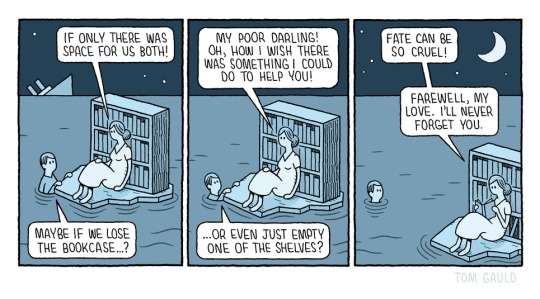
My cartoon for this week’s Guardian Books.
p.s. latest book Is REVENGE OF THE LIBRARIANS: www.tomgauld.com/comic-books-v2
11K notes
·
View notes
Text
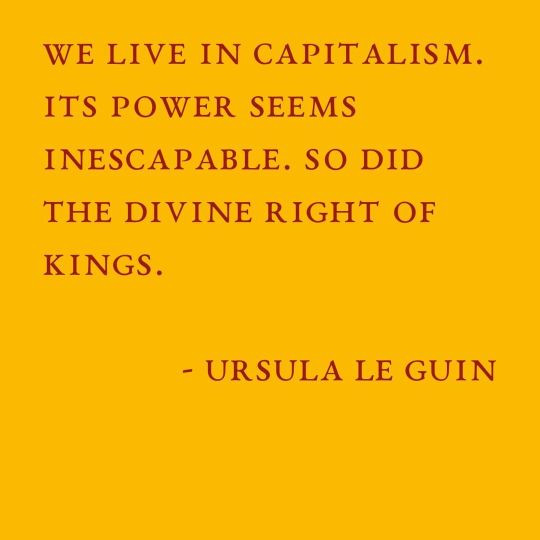
Your reminder...
Don't give up.
#ursulaleguim
1 note
·
View note
Text
I'm not generally one for making statements with great certainty or fixedness. But, I occasionally step out of my ambivalence to make an assertion or two. Here's one I wholeheartedly believe in. When we use language just as a tool for communicating with one another, we're only using one facet of this extraordinary faculty. How about we take the risk that we might be casting spells, singing to a set of unseen forces, when we open our mouths? This is what I'm here for.
Be open to the possibility that poetry, storytelling and eloquent speaking have the power to change the world in ways that are subtle and profound. And not just through human comprehension and the movements of our hearts and imaginations, but through the way language sings in the invisible landscape. The subtle world is changed through the way we converse with it and so is this unsubtle world we know as our home.

0 notes
Text

I was reminded of this today. Those last five lines are just gold. Have an excellent weekend Or, at least, keep fighting.
#thepoeticcommunity#poets#poeticcommunity#poetsclub#apoemaday#poetryisnotdead#poetrylovers#poetry#feralangels#poetsoftumblr
9 notes
·
View notes
Text
Some books change the way you use language, the way you write and the set of possibilities you see as a writer.
I still remember reading this on a train from Edinburgh to Norwich in about 1993 or 94. I was amazed. I spent a few years trying to write like Cormac McCarthy and then (thankfully) gave up.
But, this book - and In the Skin of a Lion by Michael Ondaatje, which I was reading at the same time - left its mark on me in a way I still don't have words for.
I can barely remember the story, which is interesting, but I remember the landscape of the words and the sound of the book, like a dream or the memory of a season.
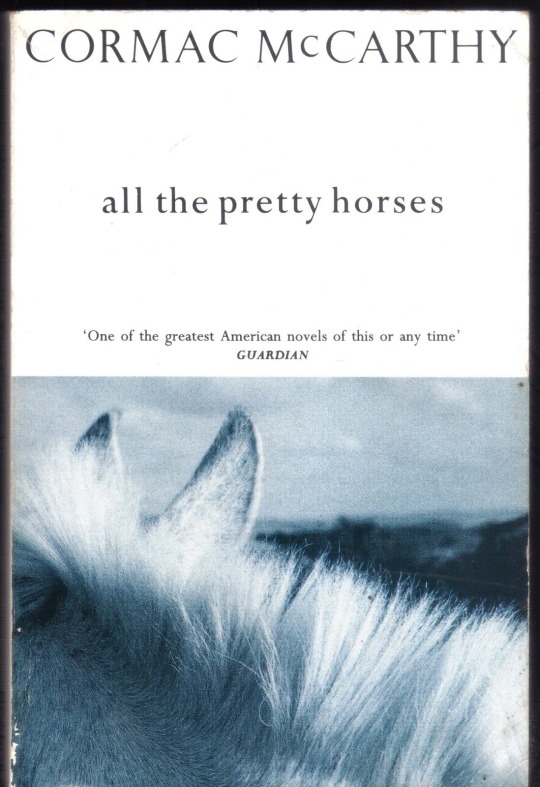
2 notes
·
View notes
Text

my latest for New Scientist
Lots more here: www.newscientist.com/author/tom-gauld/
5K notes
·
View notes




